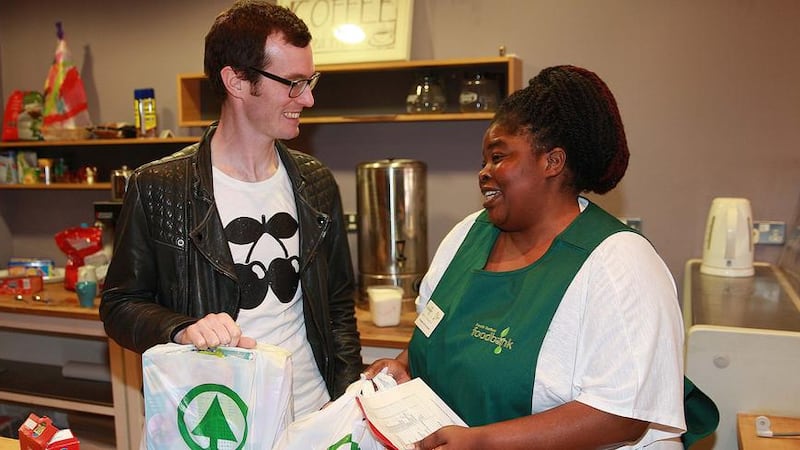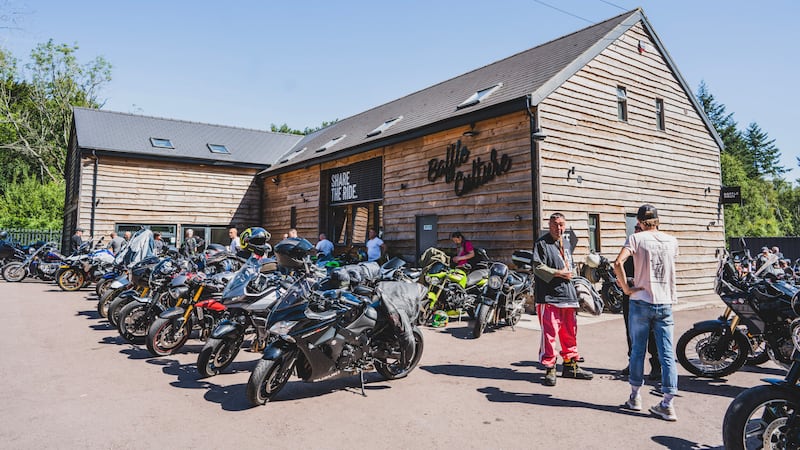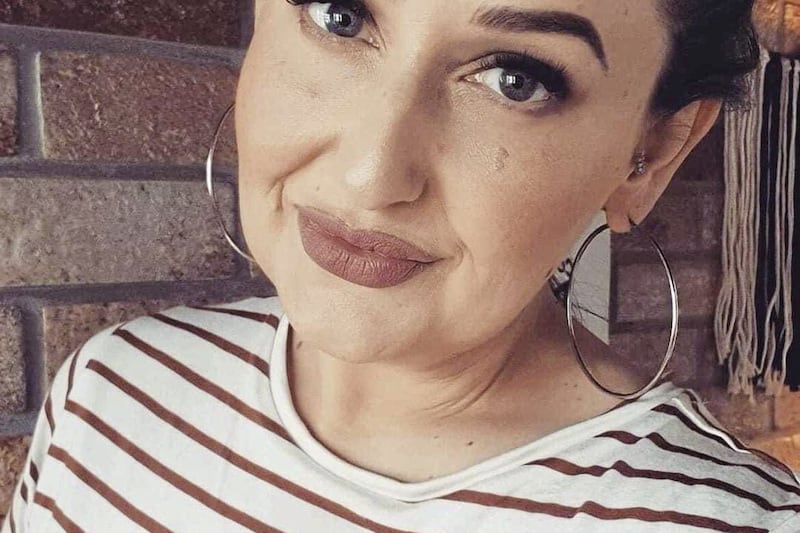FOOD banks are again in the headlines again in the run-up to the election after David Cameron responded that things weren't economically perfect yet when asked how he felt about the fact many people were dependent on them.
His understated assessment is borne out by the Trussell Trust, which runs more than 450 food banks; it announced recently that just over one million people across the UK had used one of their food banks in the past year. Some of them gathered last Friday at the Mornington Community Centre in Belfast's lower Ormeau Road.
Although the notion of relying on handouts to satisfy the most basic need, hunger, seems Dickensian, the atmosphere in this former cafe was distinctly upbeat. Adults attending the South Belfast Food Bank came in and chatted over tea or coffee as they ticked what food and essentials they needed on the lists handed out. Members of referring agencies joined them and a little boy wheeling his teddy bear in a miniature pushchair ran about.
As City Church pastoral assistant Bruce Gardiner-Crehan explained, he and others saw the need for a local food bank in south Belfast a year ago. He describes hidden poverty and even destitution in this mixed constituency.
"South Belfast is a melting pot of people with a real mixture of families and some really vulnerable people. To qualify for the food bank, you need a voucher from referral agencies which include groups like Women's Aid who while tackling abuse might find needy women and children thrown out of their homes.
"There are asylum seekers and refugees referred by NICRAS (the Northern Ireland Community of Refugees and Asylum Seekers). And social services may notice empty cupboards when visiting clients." The need is growing, according to the Trussell Trust, with over 17,000 Northern Irish clients helped during 2015-2015.
The food bank opened in October 2014 with support from several churches across the community from City to Fitzroy and St Malachy's, and a desire to remove any possible stigma about needing to come here. So the food bank sign is small, the carrier bags are from Tesco, and the welcome is warm.
On average up to 20 people and their families are helped to survive each week via this service which opens on Monday, Wednesday and Friday and is manned by volunteers. The food comes from the public and from 21st century benefactors like Tesco who also have in-store lists of food bank requirements for customers to buy and donate.
At the back of the centre there is the food store. Not a cornucopia exactly, it nonetheless holds racks full of pasta, pulses, tinned foods and packs of mashed potato plus other essentials like nappies for families in need. Occasionally they are given fresh fruit and vegetables by greengrocers which need to be distributed fast. There is a voucher system, and it works.
One new volunteer who has herself used the South Belfast Food Bank is teacher Beauty Chiyangwa. She came to Belfast two years ago from rural Zimbabwe and is currently waiting for her asylum appeal to be processed, having suffered because of the political set-up in her country. Beauty is enthusiastic about the help she has received here and had no hesitation in telling her story, saying it was important to speak out on behalf of all Africans who are instinctively private.
"Seven months ago, after I got my refusal (for asylum status), my benefits had to stop. A friend told me about the food bank and I rang Brenda, one of the volunteers, to find out more. She was lovely and when I arrived, had a very big smile."
It took courage to walk through the door and Beauty says now that she was concerned about the concept of something for nothing. "I was very scared because where I come from, nothing is for free, there are always strings attached. Finally I told myself 'One, two, three, I'm going in.' I was immediately offered a cup of tea."
Beauty had a voucher and was handed one of the food lists. She laughs as she says she was also consulted on her likes and dislikes. "I didn't want rice as I'm not a fan, and I don't like soup which is typically African."
Trussell Trust food banks hand out nutritionally assessed amounts of food intended to last three days with the idea that clients are then referred to other agencies. But Beauty, husbanding her food, says what she received that day filled five bags and lasted for more than a week.
Underlining the fact that food bank clients are treated as people whose dignity should be respected, there was an extra gift in the bags: perfume. Beauty says: "I also had some toiletries. When I left, I couldn't believe it, I had a toothbrush, baby powder." Beauty, who taught 10-to-12-year-olds in Zimbabwe and speaks Shona, as well as very good English, would like to resume her career. "So far, so good." she says.
Being involved in the food bank is part of her integration into a new country which, as Beauty observes, seemed surprising at first. "The weather, the environment, the accents were all different. I prayed to God to help me understand the people I would be talking to." she says with a smile.
As I'm told several times, the Trussell Trust is about more than just food. Bruce and the team aim to identify the problems that have brought people through the door such as debt or unemployment then direct clients to charities or agencies that can help such as Christians against Poverty.
Brenda Johnson, one of the volunteers, tells me that they have helped people with debt and mental health issues. "We try and make sure the lonely go to a friendship club, that people who need it are referring to an international agency. The Prince's Trust is also a great help."
Bruce says that he would like alternative approaches to tackling poverty to come on to the political agenda. "I would love society to eradicate poverty; I don't see this as the solution and have been shocked by some of the cases we see. Early on, one guy who was waiting for his family to join him got assistance from the Red Cross. But he was proud and wouldn't come to us until his children arrived, even though he hadn't had enough food for months. Those guys who were canvassing for votes during the election need to make this a priority. It isn't right we have begging on the streets and poverty behind closed doors."
Some more people drift in at around 12.30pm. "No juice," says one guy firmly, looking at his list. A couple of women chat animatedly over coffee; there is a social bonus about the place which opens three times a week. A mix of local Belfast people and members of the immigrant community are benefitting from this vital service. "But," Bruce says, "what we want, of course, is for this place to close and not be needed."
:: The South Belfast Food Bank is open on Monday, Wednesday and Friday from 11.30am to 1pm at 117 Ormeau Road in the Mornington Community Centre. For more information or to donate or get involved, visit www.southbelfastfoodbank.org.uk
FACTS AND FIGURES
:: The Trussell Trust reports that over 17,000 people in Northern Ireland used their food banks within the Past year, including 7571 children.
:: The top reason for referral to a food bank was, unlike the rest of the UK, low income, accounting for 37 per cent of referrals
:: The number of clients needing to use food banks continue to grow
:: The second and third most significant reasons for attendance at a food bank here are benefit delays (16 per cent) and benefit changes (8 per cent)








